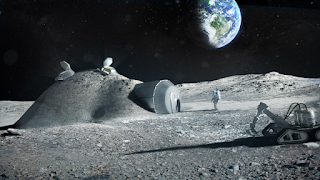The acquisition of the moon Will the conflict of the world's countries turn into a war in space?
European Space Agency
Nearly half a century after the last American manned flight to space, and despite many doubts that America had ever landed on the moon, not to mention Neil Armstrong’s walk on its surface during the “Apollo 11” flight on July 21, 1969, which opened the door to 5 flights Another, the most recent of which was the Apollo 17 flight in 1972, it seems that the matter has begun to take a new turn that will not only increase the conflict between the great powers, but also intensify the competition between giant companies as well.
While the recent years have witnessed the entry of giant companies owned by people in the race to reach space and the moon in particular, along with other countries such as India, Japan and the European Union, fears have increased that the moon will be a new point of conflict between the great powers, and questions have increased about who owns the moon? And what is its importance?
Who owns the moon?
Theoretically, no one owns the moon, according to the United Nations Treaty on Outer Space signed in 1967, which states that it and the rest of the celestial bodies belong to all of humanity, but in practice the answer is completely different, as the moon or parts of it belong to whoever can access them first, preserve and protect them second.
The Americans view themselves as the owners of the natural right to the moon, specifically its natural resources, since they are the first to explore it and send manned flights to its surface. Accordingly, Washington has adopted in recent years new policies in order to enhance cooperation between its various local ministries and link it closely with the Ministry of Defense and companies. The private sector that has experiences and expertise gained from its space flights, with the aim of facing the competition and challenges posed by China and Russia.
At a time when NASA is preparing to return humans to the moon again in 2024 through its flight called (Artemis), Russia and China announced their plans to build a lunar orbital station similar to the one that America will build in cooperation with the European Union and Japan, which will carry Gateway's name.
In this regard, Russia announced earlier this year that it would continue talks with China and other international partners on establishing a joint scientific research base on the moon by 2028, with the aim of confronting the "American Century Project" that seeks to militarize the moon and control the world.
It is reported that China managed to send the first national probe to the moon in January 2019, and its Jurong spacecraft landed successfully on the surface of Mars months ago.
What's there?
The natural resources on the Moon have attracted the attention of superpowers and giant corporations alike.
There are many reasons that have increased the importance of colonizing the moon in recent decades, most notably: the establishment of human colonies outside the planet due to fear of climate changes that could affect the future of life on Earth, in addition to establishing military bases with the aim of controlling the world below them and serving as a An initial step for the militarization of space.
In addition to human and military facilities, the natural resources on the moon are of great interest to superpowers and giant companies alike, especially helium 3 and ice, which will cause a qualitative leap in the fields of energy and modern high-speed transportation.
Another reason that makes the moon an attractive destination for major companies is tourism. In recent years, competition between companies in relation to space tourism has intensified, for example, the company "SpaceX" owned by American billionaire Elon Musk revealed in late 2018 the name of the first tourist to the moon in the world, the young Japanese billionaire Yuzaku Manizawa, whose journey will start in 2023 .
Will the moon ignite the spark of the space war?
With scientific and technological progress and the intensification of commercial competition between major companies, in addition to the beginning of the depletion of some natural resources from the planet, eyes turned to the moon, which serves as an initial space probe station in search of new riches on the surface of its planets and asteroids. While scientific studies have confirmed that extracting natural resources from space objects, it can inject tens of billions of dollars into the world economy in the near future.
The current raging race to colonize the moon will increase the possibility of space wars, which began to prepare for it since the late fifties of the last century, and culminated during the Reagan administration, which allocated a huge budget to the militarization of space in what was known at the time as “Star Wars.”
Despite all the preparations and the passage of more than 6 decades, no military confrontation broke out in outer space and no satellite of an enemy country was destroyed. But the last two decades have witnessed training missions for space wars, most notably what China did in 2007 when it launched a ballistic missile with the purpose of destroying one of its satellites used to monitor weather and weather conditions, and another attempt by America in 2008 when it launched a tactical missile of the type “SM3” that was destroyed by During which one of its disabled spy satellites.




Good
ReplyDelete